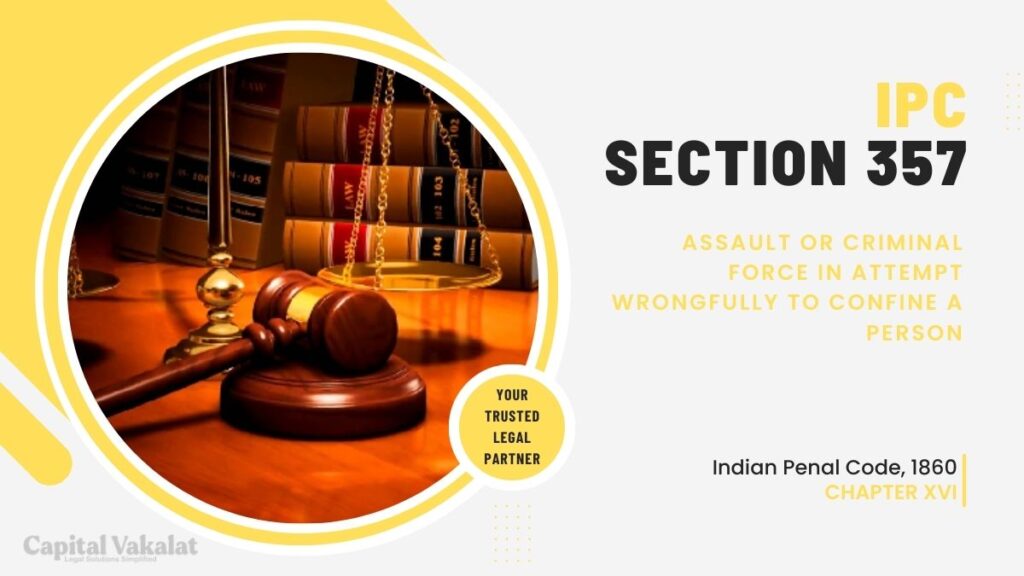In the complex tapestry of legal statutes, Section 357 of the Indian Penal Code (IPC) stands out as a crucial provision addressing the issue of assault or criminal force in the attempt to wrongfully confine a person. This article delves into the nuances of Section 357 IPC, exploring its significance, legal implications, and the evolving landscape of cases related to wrongful confinement.

Section 357 IPC plays a pivotal role in the Indian legal system by addressing situations where individuals use force or intimidation in an attempt to wrongfully confine someone. This provision serves as a deterrent against actions that violate an individual’s freedom and safety, reflecting society’s commitment to protecting its members.
Understanding Section 357 IPC
The language of Section 357 is crafted with precision, outlining the specific acts that constitute assault or criminal force leading to wrongful confinement. To comprehend its implications fully, it is essential to break down the legal text, dissecting each element and understanding its significance in the broader context of criminal law.
Importance of Wrongful Confinement
Wrongful confinement, as defined under Section 357 IPC, goes beyond mere physical restraint. It encompasses situations where individuals intentionally restrict someone’s movement without legal justification. Exploring real-life scenarios helps illustrate the gravity of wrongful confinement and the potential harm it inflicts on the victim.
Legal Consequences for Offenders
The legal system recognizes the severity of offenses falling under Section 357 IPC. Offenders face significant penalties, including imprisonment, fines, or both. Examining judicial precedents and landmark cases provides insight into how the courts interpret and apply the provisions of this section.
Role of Intent in Section 357 Cases
A critical aspect of Section 357 cases revolves around the perpetrator’s intent. Distinguishing accidental acts from intentional ones is crucial in establishing guilt. This section requires a clear demonstration of wrongful intent, adding a layer of complexity to legal proceedings.
Challenges in Enforcing Section 357 IPC
Despite its importance, enforcing Section 357 poses challenges for law enforcement and the judiciary. Investigating such cases can be intricate, and proving wrongful intent in court adds an additional layer of complexity. Understanding these challenges is vital for improving the effectiveness of legal mechanisms.
Protective Measures for Potential Victims
For individuals at risk of wrongful confinement, knowing the legal remedies available is essential. This section explores the protective measures victims can take, including seeking restraining orders, filing complaints, and relying on the support of law enforcement and the community.
Evolution of Section 357 IPC
Tracing the historical development of Section 357 IPC reveals the changing societal perspectives on wrongful confinement. Amendments over the years reflect an ongoing effort to adapt the law to contemporary challenges and ensure its relevance in addressing evolving forms of assault and criminal force.
Comparative Analysis with Other Legal Provisions
Comparing Section 357 IPC with similar statutes in other jurisdictions sheds light on the strengths and weaknesses of the Indian legal framework. Understanding how different legal systems approach the issue provides valuable insights for ongoing legislative discussions and reforms.
Conclusion
In conclusion, Section 357 IPC serves as a vital tool in the legal arsenal against assault or criminal force leading to wrongful confinement. Its evolution, challenges in enforcement, and the role of intent all contribute to its significance in safeguarding individual liberties. As society continues to grapple with new challenges, the relevance of Section 357 IPC remains undiminished.
Frequently Asked Questions
How does the court determine wrongful intent in Section 357 cases?
Establishing wrongful intent involves a thorough examination of the circumstances surrounding the confinement. The court considers factors such as the actions of the perpetrator, the duration of the confinement, and any explicit threats or coercion involved.
What legal remedies are available to victims of wrongful confinement?
Victims can seek various legal remedies, including filing complaints with law enforcement, obtaining restraining orders, and pursuing civil action for damages. The specific recourse depends on the nature and severity of the confinement.
Has Section 357 IPC been amended recently, and how has it adapted to modern challenges?
While the article provides a historical perspective on Section 357 IPC, it’s essential to consult the latest legal sources for information on recent amendments. The law undergoes periodic revisions to address contemporary issues.
Are there any international standards or conventions related to the prevention of wrongful confinement?
While Section 357 IPC is specific to Indian law, international conventions such as the Universal Declaration of Human Rights emphasize the protection of individual liberties, contributing to a global framework against unjust confinement.